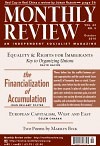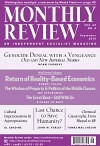2010

To understand the disaster that is present-day economics, it is crucial to recognize that we are living today, not only in the deepest economic crisis/stagnation since the Great Depression, but also—as Paul Krugman declared in his New York Times blog on January 27, 2009—in “A Dark Age of Macroeconomics,” in which the central discoveries of the 1930s have been forgotten or discarded. “What made the Dark Ages dark,” Krugman wrote, “was the fact that so much knowledge had been lost, that so much known to the Greeks and Romans had been forgotten by the barbarian kingdoms that followed.” The critical knowledge lost that gave rise to the new Dark Age in Macroeconomics, he claimed, was none other than the Keynesian Revolution centered on the critique of Say’s Law, or the notion that supply creates its own demand. In the context of arguing against government deficit spending, leading economists at the University of Chicago, the bastion of reaction in economics, have reverted to a “pure Say’s Law, pure ‘Treasury view’” by insisting that increased savings automatically lead to increased investment, while government borrowing invariably “crowds out” investment | more…
In 1997, in his last published article, Paul Sweezy referred to “the financialization of the capital accumulation process” as one of the three main economic tendencies at the turn of the century (the other two were the growth of monopoly power and stagnation). Those familiar with economic theory will realize that the phrase was meant to be paradoxical. All traditions of economics, to varying degrees, have sought to separate out analytically the role of finance from the “real economy.” Accumulation is conceived as real capital formation, which increases overall economic output, as opposed to the appreciation of financial assets, which increases wealth claims but not output. In highlighting the financialization of accumulation, Sweezy was therefore pointing to what can be regarded as “the enigma of capital” in our time | more…
There are three dimensions to the current, unprecedented global crisis of capitalism: economic, ecological, and political.
Let us look first at the economic dimension, which will be our main concern in this article. Capitalism is facing a major realization crisis—an inability to sell the output produced, i.e., to realize, in the form of profits, the surplus value extracted from workers’ labor. Neoliberalism can be viewed as an attempt initially to solve the stagflation crisis of the 1970s by abandoning the “Keynesian consensus” of the “golden age” of capitalism (relatively high social welfare spending, strong unions, and labor-management cooperation), via an attack on labor. It succeeded, in that profit rates eventually recovered in the major capitalist economies by the 1990s | more…
Organizing immigrant communities is not a matter of taking pity on the downtrodden. It is a matter of understanding what is necessary for the survival of our communities, of our labor movement. If we are serious in wanting to build political power, then we must incorporate migrant workers, fight for their rights, and make the movement for social justice one that belongs to all of us, documented and undocumented. | more…
When Marilyn Buck died last August 3, she had lived outside prison, on parole, for only twenty days. At age sixty-two, she had spent her last twenty-five years in various maximum security prisons. Before that, she lived years underground, supporting and taking part in actions with the Black Panther Party and later, the Black Liberation Army. Marilyn was a white woman who carried a great deal of pain, most of which came from her unflinching acknowledgement of the centuries of untold inequities suffered by African Americans and other people of color at the hands of “freedom-loving” white America | more…
The Great Financial Crisis began in the summer of 2007 and three years later, despite a putative “recovery,” it is still having profound effects in the United States, Europe, and in much of the world. Austerity is being forced on working people in many countries. Matters are especially difficult in Greece, a country that is being compelled by the demands of bankers, including the International Monetary Fund, to squeeze its workers in return for loans from abroad to help pay down government debts. Official unemployment in the United States is still around 10 percent, and real unemployment is much higher. An unprecedented 44 percent of the officially unemployed have been without work for over six months. A record number of people are receiving government food assistance as well as meals and groceries from charities. Many U.S. states and cities, facing large shortfalls in their budgets due to falling tax revenues, are cutting jobs and reducing funding for schools and social programs | more…
Qiu Xiaolong’s Novels on the Cusp of Communism and Capitalism
The books reviewed here are Qiu Xiaolong, Death of a Red Heroine (2000), 464 pages, $14.00; A Loyal Character Dancer (2002), 360 pages, $14.00; When Red Is Black (2004), 320 pages, $13.00, all published in New York by Soho Crime; and A Case of Two Cities (2006), 320 pages, $13.95; Red Mandarin Dress (2007), 320 pages, $13.95; The Mao Case (2009), 304 pages, $13.99, all published in New York by Minotaur Books.
Qiu Xiaolong—the prolific Chinese novelist born 1953 in Shanghai and a resident of the United States since 1988—has made a fetish of the word and the color red, not surprisingly, since he writes about Red China. Three of his innovative novels include red in the title: Death of a Red Heroine (2000), When Red Is Black (2004), and Red Mandarin Dress (2007). In all three of these books, the main character is a sensitive, poetry loving, yet tough-minded police inspector who works for the Shanghai Police Bureau; he’s on the city payroll and doesn’t work as a free-lance private eye for hire | more…

During the period stretching from the 1970s through the 1990s, Monthly Review, under the editorship of Harry Magdoff and Paul Sweezy, stood apart in its analysis of the tendency to economic stagnation in advanced capitalism and its view that the economic slowdown beginning in the 1970s was a manifestation of this secular tendency. The financial explosion that also emerged in these years was seen as an attempt by the system to stave off stagnation by means of credit-debt expansion, but at the cost of increasing financial fragility | more…
Over the past generation, the U.S. economy as well as most of the rest of the global economy have been dominated by the idea that free market capitalism produces dynamic growth, financial stability, and as close as we are likely to come to a fair society. Supporters of this pro-market framework hold that government interventions to encourage growth, stability, or even fairness will almost always produce more harm than good. This mode of thinking has been the intellectual foundation for the era of financial deregulation in the United States—the dismantling of the Glass-Steagall regulatory system that was built amid the rubble of the 1929 stock market crash and ensuing 1930s Depression. The Clinton administration provided the final nails in the coffin of financial regulation with the passage of the Financial Services Modernization Act in 1999 | more…
At the end of the twentieth century, while financial economists satisfied their intellectual pretensions to useful knowledge by conjuring up visions of a world peopled with materialistic consumer-investors optimizing rationally in accordance with their willingness to hazard their wealth, the propertied classes themselves were succumbing to new delusions fostered by the financial markets. The reasoned response of propertied individuals to their experience of the world of speculative finance has created a new political culture with important consequences for the political economy of capitalism | more…
Perhaps the most shattering lesson from [the] powerful inquiry [of Edward S. Herman and David Peterson in The Politics of Genocide] is that the end of the Cold War opened the way to an era of virtual Holocaust denial. As the authors put it, more temperately, “During the past several decades, the word ‘genocide’ has increased in frequency of use and recklessness of application, so much so that the crime of the 20th Century for which the term originally was coined often appears debased.” Current usage, they show, is an insult to the memory of victims of the Nazis | more…
Twenty-five years ago, a runaway chemical reaction in a tank at a Union Carbide (UC) pesticide factory created a poisonous gas which, unimpeded by the factory’s safety devices, spewed out over the sleeping population of the Indian city of Bhopal. Amnesty International estimated that seven thousand to ten thousand died in the catastrophe’s first three days, and that, by 2004, another fifteen thousand died. Prior to Bhopal, concern over toxic chemicals was confined to long-term or chronic effects on human health and the environment. Bhopal, however, showed that the manufacture, storage, and use of toxic chemicals also posed a major, acute risk to the safety of those working in and living around petrochemical plants and complexes | more…
Growing up on a Midwestern farm while Marx worked on the final draft of Capital, Vol. I, was a boy who, as a man, would have a very different take on the relationship of workers to the products of their labor. Thorstein Veblen would become famous for what he wrote about the fetishized commodities of consumers.…For Veblen, all the nonessentials that we purchase as consumers reflect standards of respectability established by the upper class. The “motive that lies at the root of ownership is emulation,” he wrote, not just of others but of wealthy and powerful others. Under capitalism, one’s property “becomes the conventional basis of esteem,” by which Veblen meant both the high regard of others and self-esteem.…Over the past few decades, however, standards for personal appearance have been transformed in ways that seem to turn Veblen’s conspicuous consumption idea inside out | more…

